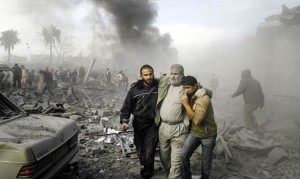 The U.N.’s top human rights official backed a report Thursday accusing Israeli forces and Palestinian militants of war crimes during their conflict in Gaza last winter.
The U.N.’s top human rights official backed a report Thursday accusing Israeli forces and Palestinian militants of war crimes during their conflict in Gaza last winter.
Navi Pillay’s endorsement of the report by an expert group led by Judge Richard Goldstone came as Israel warned the U.N. Human Rights Council that approving the document risked undermining Middle East peace.
Pillay told the 47-member council that she supported the report’s recommendations, “including its call for urgent action to counter impunity” – meaning that Israel and Hamas must investigate and prosecute those who committed war crimes.
The 575-page report concluded that Israel used disproportionate force, deliberately targeted civilians, used Palestinians as human shields, and destroyed civilian infrastructure during its Dec. 27-Jan. 18 incursion into the Gaza Strip to root out Palestinian rocket squads.
It accused Palestinian armed groups including Hamas of deliberately targeting civilians and trying to spread terror through rocket attacks on southern Israel.
Almost 1,400 Palestinians and 13 Israelis were killed during the three-week conflict.
Pillay said it was necessary for both sides “to carry out impartial, independent, prompt, and effective investigations into reported violations of human rights and humanitarian law” as recommended by the report.
Israeli Ambassador Aharon Leshno-Yaar rejected the Goldstone report as “biased and flawed,” warning that a vote endorsing the document “will set back hopes for peace.” He accused the council, which has a history of passing resolutions critical of the Jewish state, of using the report for more “Israel bashing.”
The United States has taken a similar view that excessive attention to the report and alleged crimes in the Gaza war could hamper efforts to rejuvenate struggling peace efforts between Israelis and Palestinians.
“We stand at an important moment, and must all be mindful of the larger context of ongoing efforts to restart permanent status negotiations that would lead to the creation of a Palestinian state” said U.S. diplomat Douglas M. Griffiths.
But Pillay, the U.N. high commissioner for human rights, said holding war criminals accountable and respect for human rights “are not obstacles to peace, but rather the preconditions on which trust and, ultimately, a durable peace can be built.”
The council is debating a resolution that would endorse the Goldstone report’s recommendation for the Security Council in New York to determine within six months whether both sides are carrying out credible investigations into alleged abuses. If they aren’t, the matter should then be referred to prosecutors at the International Criminal Court in The Hague, Netherlands.
The draft resolution suggests U.N. Secretary-General Ban Ki-moon should also monitor Israeli and Palestinian compliance with the report. A vote is expected Friday.
U.S. and European diplomats are opposed to sending the report to the more powerful Security Council for action.
Washington supports calls for those responsible for violations to be held accountable, but wants this to be done by Israeli and Palestinian authorities themselves, said Griffiths, the U.S. diplomat.
“Countries need and deserve the space to work through what processes will be most effective, and this cannot be dictated from outside,” he said.
Palestinian and Israeli rights groups warned Thursday against burying the report.
“I don’t think you can build a peace process on injustices that you try to sweep under the rug,” said Jessica Montell, head of the Israeli human rights group B’Tselem.
“We hope the Goldstone report doesn’t end as piles of paper,” added Raji Sourani, director of the Palestinian Center for Human Rights.